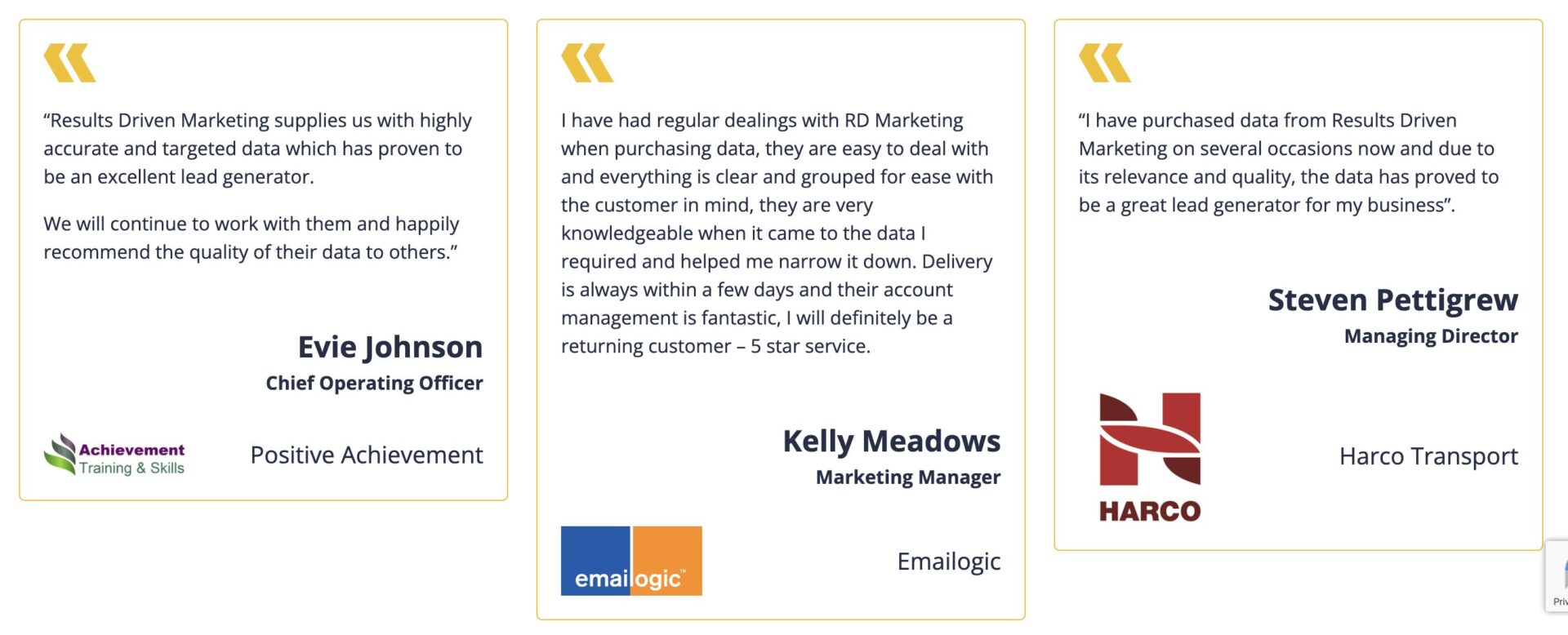
Cold Call Lists | Everything You Need To Know
Cold call lists are a fundamental tool in the world of sales and marketing, offering a structured approach to reaching potential customers.
These lists, often a compilation of contact information and demographic details, are crucial for businesses looking to expand their outreach. They serve as a starting point for sales teams to initiate conversations with prospective clients who might be interested in their products or services.
By leveraging cold call lists, companies can effectively target their audience, personalise their sales pitch, and improve the chances of converting leads into customers.
Table of contents:
What is a Cold Call List?
A cold call list, at its core, is a curated collection of potential leads or contacts that businesses aim to approach, typically without prior interaction. Think of it as a treasure map, where X marks the spot of potential clients or customers. These telemarketing lists are meticulously crafted, often sourced from various databases, ensuring that the contacts are relevant to the business’s offerings. It’s not just about having names and numbers; it’s about having the right names and numbers.
Why Use a Cold Calling List?
- Precision Targeting: With a cold calling list, businesses can ensure that they’re reaching out to the most relevant audience, increasing the chances of a positive response.
- Efficiency: Time is money. Instead of shooting in the dark, a cold call list provides a clear direction, ensuring that sales teams spend their time and resources wisely.
- Data-Driven Decisions: In the age of information, basing decisions on data is paramount. Cold call lists are backed by research and data, ensuring that every call has a purpose.
- Scalability: As businesses grow, so do their outreach efforts. Cold calling lists can be scaled up or down based on the business’s needs, ensuring flexibility.
Why Using Cold Call Lists Represents Such a Big Opportunity
Using cold call lists is such a powerful opportunity for businesses looking to expand their reach and grow their client base.
A well-curated cold call list provides direct access to decision-makers, cutting through the noise and allowing you to build relationships quickly and effectively. Here’s why it’s a big opportunity:
- Targeted Outreach: With a cold call list tailored to your industry, location, or target audience, you’re not just calling random numbers. You’re reaching key individuals who are more likely to be interested in what you have to offer.
- Cost-Effective Lead Generation: Cold calling is one of the most affordable ways to generate leads. Paired with a high-quality list, it ensures your efforts are focused on prospects that matter, delivering a strong ROI.
- Personal Connection: Unlike email or other forms of digital marketing, cold calling allows for real-time interaction. This personal touch can build trust and create opportunities that digital channels might miss.
- Quick Feedback: Cold calls provide immediate insights into your audience’s needs, objections, and pain points. This real-time feedback can help you refine your pitch and improve your overall strategy.
- Scalable Growth: Whether you’re a small business looking to grow or an established company expanding into new markets, cold call lists provide a scalable way to connect with potential clients.
When used strategically, cold call lists open the door to meaningful conversations and valuable opportunities. With the right data in hand, your sales team can focus on building relationships, addressing client needs, and closing deals. It’s a proven way to drive business growth and stay ahead of the competition.
Who Uses Cold Call Lists?
Cold call lists are an invaluable resource for businesses looking to connect directly with senior purchasing decision-makers within UK SMEs. These telemarketing lists are used across a variety of industries and business functions to drive meaningful conversations, generate leads, and close deals. Here’s a look at who benefits most from using cold call lists:
- Sales Teams: For sales professionals, cold call lists are a goldmine. They provide direct access to decision-makers, helping sales teams bypass gatekeepers and pitch their products or services to the right people.
- B2B Marketers: Marketing teams use cold call lists to support multi-channel campaigns, combining telemarketing efforts with email, direct mail, and social media outreach to maximise engagement and conversions.
- Service Providers: From IT consultants to financial advisors, businesses offering services to SMEs use cold call lists to introduce their solutions and schedule consultations with decision-makers.
- Event Planners: Organisers of webinars, workshops, or industry events use cold call lists to personally invite senior-level attendees, ensuring their events attract the right audience.
- Small and Growing Businesses: Startups and SMEs leverage cold call lists to expand their reach and build connections with key players in their target industries, accelerating their growth.
- Product Manufacturers and Suppliers: Companies use cold call lists to reach procurement teams and decision-makers, promoting their products and discussing partnership opportunities.
Whether you’re looking to generate leads, promote an event, or expand your client base, a well-curated cold call list gives you the opportunity to connect directly with decision-makers who can drive your business forward. By focusing your efforts on relevant and qualified prospects, cold call lists help you save time, streamline your outreach, and achieve better results.
Why Buy a Cold Call List from Results Driven Marketing?
When it comes to connecting with senior purchasing decision-makers within UK SMEs, a high-quality cold call list is your secret weapon. At Results Driven Marketing, we specialise in providing businesses with accurate, targeted, and GDPR-compliant telemarketing lists designed to deliver real results. Here’s why you should choose us for your cold call list needs:
- Tailored Targeting: Our cold call lists are customised to suit your specific requirements, whether you’re targeting decision-makers in a particular industry, geographic location, or company size. This ensures your outreach is focused, relevant, and impactful.
- Accurate and Up-to-Date Data: Outdated or incorrect contact information can waste valuable time and resources. Our lists are regularly refreshed to guarantee you’re working with reliable, actionable data.
- GDPR-Compliant: Protecting your business is our priority. All our cold call lists are fully GDPR-compliant, giving you peace of mind while maintaining trust with your prospects.
- Proven ROI: Clients using our cold call lists consistently see better connection rates, higher engagement, and more closed deals. Our data gives your sales and marketing teams the edge they need to succeed.
- Expert Support: With over 7 years of experience, we’re here to help you make the most of your cold call list. From selecting the right data to optimising your telemarketing strategy, our team is on hand to support your success.
When you buy a cold call list from Results Driven Marketing, you’re investing in more than just a database—you’re gaining a strategic tool to unlock meaningful conversations, generate high-quality leads, and grow your business. Let’s work together to take your telemarketing campaigns to the next level!
What Our Clients Say About Our Cold Call Lists
At Results Driven Marketing, we take pride in helping businesses connect with senior purchasing decision-makers through our reliable and effective cold call lists. Our clients consistently see the value in using accurate, GDPR-compliant data to drive their telemarketing campaigns, and the results speak for themselves.
Here’s what some of them have to say:
Want to hear more success stories? Visit our Testimonials Page to see how we’ve helped businesses like yours achieve their goals.
Curious about the potential return on investment for your next telemarketing campaign? Use our ROI Calculator to explore how a cold call list from Results Driven Marketing can make a measurable difference. Let us help you achieve your telemarketing goals!
How to Build a Cold Calling List
Identify Your Target Audience: Before diving into list building, it’s crucial to have a clear understanding of who you want to reach. This involves defining demographics, industries, job roles, and more.
Source Reliable Data: There are numerous databases and platforms available that offer contact information. However, it’s essential to choose a buy data from a reputable source to ensure the data’s accuracy and relevance.
Segment and Categorise: Once you have the b2b data, segment it based on various parameters like industry, job role, geographic location, etc. This helps in tailoring your outreach strategy for different segments.
Regularly Update: The business world is ever-evolving. Contacts change roles, companies merge, and industries shift. Regularly updating your cold call list ensures that it remains relevant and effective.
Tips for Effective Cold Calling
- Do Your Homework: Before making that call, research the contact. Understand their role, their company, and any recent news or developments related to them. This not only shows that you’re genuinely interested but also helps in tailoring your pitch.
- Practice Active Listening: It’s not just about talking; it’s about listening. Understand the needs and concerns of the person on the other end. This helps in building trust and rapport.
- Personalise Your Approach: No one likes a generic pitch. Personalise your approach based on the contact’s role, industry, and needs. This increases the chances of a positive response.
- Follow Up: One call might not do the trick. It’s essential to follow up, but ensure that it’s not too aggressive. Find the right balance to keep the conversation going.
With these insights in hand, navigating the world of cold call lists becomes a breeze. Remember, it’s not just about making calls; it’s about making connections. And with the right cold call list, those connections are just a phone call away.
The Telephone Preference Service (TPS)
In the vast ocean of cold calling, there exists an island of choice and preference, known as the Telephone Preference Service or TPS. It’s a name that might sound familiar to many, especially those who wish to have a say in the calls they receive. But what is this service all about? And how does it intertwine with the world of cold call lists? Let’s embark on this journey of discovery.
What is the TPS?
The Telephone Preference Service, often abbreviated as TPS, is a free service that allows individuals to opt out of receiving unsolicited sales and marketing telephone calls. It’s like a protective shield, ensuring that registered numbers are kept away from the reach of those pesky unwanted calls. For businesses, especially those relying heavily on their cold call list, understanding the TPS is crucial. It’s not just about respecting preferences; it’s about ensuring compliance and building trust.
How does it work?
The mechanics behind the TPS are straightforward yet effective:
- Registration: Individuals or businesses can register their numbers with the TPS. This signals their preference to not receive unsolicited sales or marketing calls.
- Screening: Companies that rely on cold calling should screen their cold call list against the TPS register. This ensures that they don’t call numbers that have opted out.
- Protection: Once registered, the number is protected from unsolicited calls, with certain exceptions like market research calls.
Register your mobile or landline number
Taking control of the calls you receive is a simple process:
Visit the TPS Website: Navigate to the official TPS website.
Enter Your Details: Provide the necessary details, including your mobile or landline number.
Confirm Registration: Once registered, it typically takes around 28 days for the service to become fully effective. After this period, you should notice a significant reduction in unsolicited calls.
Check a number or find out more about the TPS
For businesses, especially those with a robust cold call list, it’s essential to ensure that their outreach doesn’t infringe on the preferences of those registered with the TPS. Here’s how:
- Access the TPS Register: Companies can access the TPS register to check numbers before making calls.
- Stay Updated: The TPS register is continually updated, so it’s crucial to check regularly, ensuring that your cold call list remains compliant.
- Seek Guidance: If in doubt, the TPS website offers a wealth of information and guidance on best practices, ensuring that businesses can cold call with confidence and respect.
In the realm of cold calling, the TPS serves as a beacon of choice and respect. It’s a reminder that while reaching out is essential, doing so with consideration and understanding is paramount. After all, a cold call list is not just about numbers; it’s about the people behind those numbers.
The Dangers and Considerations
Navigating the intricate world of cold call lists is akin to walking a tightrope. On one side, there’s the allure of instant access to potential leads, and on the other, the pitfalls that come with hasty decisions. It’s a delicate balance, one that requires careful thought and consideration. So, let’s take a moment, shall we, to explore the various facets of cold call lists, from the potential dangers to the undeniable benefits.
The Dangers of Buying Cold Call Lists
Venturing into the marketplace to purchase cold call lists might seem like a quick fix, but it’s a path fraught with risks:
- Quality Concerns: Not all lists are created equal. Some might be outdated, incomplete, or just plain inaccurate. It’s like buying a box of chocolates, but half of them are stale.
- Reputation Risks: Reaching out to individuals who haven’t expressed interest or, worse, are on the TPS register, can tarnish a company’s reputation.
- Legal Implications: Depending on the region, unsolicited calls can lead to legal repercussions, especially if they violate data protection regulations.
What are the advantages of using cold call lists?
Despite the potential pitfalls, cold call lists can offer a plethora of benefits:
- Targeted Outreach: With a well-curated list, businesses can target specific demographics, ensuring that their message reaches the right ears.
- Efficiency Boost: Instead of blindly reaching out, a cold call list provides direction, streamlining the outreach process.
- Data-Driven Decisions: A good cold call list is backed by research, allowing businesses to make informed decisions.
What are the disadvantages of using cold call lists?
However, it’s not all sunshine and rainbows:
- Initial Costs: Acquiring a high-quality list can be an investment, especially for smaller businesses.
- Maintenance Effort: Cold call lists require regular updating to remain effective and relevant.
- Potential Backlash: Unsolicited calls can sometimes lead to negative feedback, affecting brand perception.
What are the key considerations when using a cold call list?
Before embarking on the cold calling journey, it’s essential to:
- Understand Your Audience: Know who you’re reaching out to and tailor your approach accordingly.
- Ensure Compliance: Always cross-reference with the TPS and adhere to data protection regulations.
- Prioritise Quality: It’s better to have a smaller, high-quality list than a vast, inaccurate one.
What are the alternatives to using a cold call list?
For those wary of cold call lists, there are alternatives:
- Inbound Marketing: Attract potential clients through content marketing, SEO, and other inbound strategies.
- Networking: Attend industry events, webinars, and seminars to build connections organically.
- Referral Programs: Leverage existing clients or partners to gain new leads through referrals.
In the grand tapestry of business outreach, cold call lists are but one thread. They offer potential, but like all tools, their effectiveness lies in how they’re used. With careful consideration and a dash of strategy, they can be a boon. But, as always, the key is to tread wisely.
Building and Refining Your Cold Calling List
Ah, the art of crafting the perfect cold call list. It’s a journey, one that requires patience, strategy, and a sprinkle of creativity. But fear not, for it’s a journey worth embarking upon. After all, a well-curated cold call list can be the golden ticket to lead generation success. So, let’s roll up our sleeves and dive into the nitty-gritty of building and refining that all-important list.
How to Build a Cold Calling List for Lead Generation
Building a cold call list isn’t just about collecting names and numbers. It’s about curating a list that resonates with your business goals, ensuring that every call you make is a step closer to success. But how does one go about it? Let’s break it down.
Provide Value to Your Audience (Content Marketing)
Content, they say, is king. And in the realm of cold call lists, it’s the crown jewel. Here’s how it works:
- Educate and Inform: Create content that educates your audience about your offerings. This could be in the form of blog posts, whitepapers, or webinars.
- Engage and Interact: Use platforms like social media to engage with your audience, answer their queries, and build a rapport.
- Collect Data: Offer value in exchange for information. For instance, a downloadable e-book in exchange for an email address.
Join Industry Associations
Being part of industry associations isn’t just about networking; it’s a goldmine for building your cold call list. Here’s the game plan:
- Attend Events: Industry events, seminars, and conferences are teeming with potential leads. Make it a point to attend and interact.
- Leverage Membership Directories: Many associations offer member directories. With permission, these can be a valuable resource for your cold call list.
- Stay Active: Don’t just be a member; be an active one. Participate in discussions, offer insights, and position yourself as an industry expert.
Use Affiliate Partners
Affiliate partners can be the bridge between your business and potential leads. It’s a symbiotic relationship that, when leveraged correctly, can be immensely beneficial. Here’s how:
- Identify Potential Partners: Look for businesses or individuals that cater to a similar audience but aren’t direct competitors.
- Collaborate on Offers: Work together on special offers or packages that can be promoted to both audiences.
- Share Data: With mutual consent and ensuring data protection compliance, share data to enrich both your cold call lists.
In the end, building and refining a cold call list is an ongoing process. It’s not a one-time task but a continuous effort. With the right strategies in place and a keen eye for opportunities, your cold call list can be the catalyst for business growth. So, keep refining, keep reaching out, and most importantly, keep connecting.
Crafting the Perfect Cold Calling Script
Ah, the cold calling script. It’s the unsung hero of the sales world, the silent companion of every successful cold caller. But crafting the perfect script? Now, that’s an art. It’s not just about stringing words together; it’s about creating a narrative, a story that resonates with the person on the other end of the line. And when it comes to cold call lists, having a stellar script is half the battle won. So, let’s embark on this enlightening journey of script creation, shall we?
How to Create an Effective Cold Calling Script
Creating a cold calling script is akin to baking a cake. You need the right ingredients, the perfect temperature, and a touch of creativity. Miss one element, and you might end up with a flat cake. But get it right, and oh, the sweetness of success! Here’s a step-by-step guide to ensure your script rises to the occasion.
Get Your Sales Team (and All Cold Callers) Trained & Ready
Before diving into script creation, it’s essential to ensure that the team is on the same page:
- Regular Workshops: Organise workshops to train your team on the nuances of cold calling. It’s not just about the script; it’s about the delivery.
- Role Play: Practice makes perfect. Engage in role-playing sessions to simulate real-life scenarios.
- Feedback Loop: Encourage feedback from the team. After all, they’re the ones on the frontline, using the script.
Get to Know Your Customers
Understanding your audience is the cornerstone of an effective script:
- Customer Profiles: Create detailed customer profiles. Dive deep into their needs, challenges, and aspirations.
- Pain Points: Identify the pain points your product or service addresses. This will be the crux of your script.
- Industry Trends: Stay updated on industry trends and news. This allows you to tailor your script to current events, making it more relevant.
Collaborate and Draft the Script
Two heads are better than one, especially when it comes to script creation:
- Brainstorming Sessions: Gather your team and brainstorm ideas. Encourage creativity and out-of-the-box thinking.
- Draft and Redraft: Once you have a basic structure, start drafting. And then redraft. And redraft again. Perfection takes time.
- Keep It Flexible: While it’s essential to have a script, ensure there’s room for flexibility. Every call is unique, and the script should allow for personalisation.
Test and Refine
The first draft is rarely the final one:
- Pilot Testing: Before rolling out the script to the entire team, test it with a smaller group. Gather feedback and insights.
- Iterate: Based on the feedback, make necessary changes. Remember, the script is a living document, evolving with every call.
- Stay Updated: As mentioned earlier, the business world is dynamic. Ensure your script reflects current events, industry trends, and customer needs.
In the grand scheme of things, a cold calling script is more than just words on paper. It’s a reflection of your brand, your values, and your commitment to the customer. And with a well-curated cold call list in hand, a stellar script is the key to unlocking unparalleled success. So, go on, craft that perfect script, and watch the magic unfold.
Best Practices for Using Cold Calling Lists
Ah, the world of cold call lists. It’s a realm filled with potential, a treasure trove of opportunities waiting to be unlocked. But, as with any treasure hunt, there’s a method to the madness. It’s not just about having a list; it’s about using it effectively, maximising every call, every opportunity. So, let’s dive into the best practices, the golden rules, if you will, of using cold call lists to their fullest potential.
Build Your Ideal Customer Profile
Before you even think of picking up that phone, you need to know who you’re calling:
- Demographics: Understand the age, gender, location, and other demographic details of your target audience.
- Industry Insights: Dive deep into the industry of your potential leads. What are their challenges? What are their aspirations?
- Behavioural Patterns: Analyse their buying behaviour, preferences, and past interactions. Every detail counts.
Refine and Rehearse Your Sales Call Scripts
A script is your roadmap, guiding you through the call:
- Tailor to Your Audience: Ensure your script resonates with your ideal customer profile. Personalisation is key.
- Practice, Practice, Practice: Rehearse your script, refine it, and then rehearse some more. Familiarity breeds confidence.
- Stay Flexible: While a script is essential, it’s equally crucial to adapt to the flow of the conversation.
Schedule Follow Up Calls
One call is rarely enough:
- Set a Reminder: After the initial call, schedule a follow-up. Use tools or reminders to ensure you don’t forget.
- Provide Value: Every follow-up call should offer additional value, be it in the form of information, offers, or insights.
- Respect Their Time: Ensure your follow-up calls are scheduled at a convenient time for the lead.
Focus Your Sales Pitch on Their Pain Points
It’s not about you; it’s about them:
- Listen Actively: Understand their challenges and pain points. Listen more than you speak.
- Offer Solutions: Tailor your pitch to address their specific pain points. Show them how you can make a difference.
- Build Trust: It’s not just about making a sale; it’s about building a relationship.
Anticipate Objections
Objections are a natural part of the sales process:
- Be Prepared: Understand the common objections in your industry and have responses ready.
- Stay Calm: Don’t get defensive. Listen to their concerns and address them patiently.
- Seek Feedback: If a lead has objections, use it as an opportunity to gather feedback and improve.
Use Quality Sales Prospecting Tools
In the digital age, tools are your best friend:
- CRM Systems: Use CRM systems to manage your cold call lists, schedule follow-ups, and track interactions.
- Data Analytics: Analyse the success rate of your calls, understand trends, and refine your approach.
- Training Platforms: Invest in training platforms to ensure your team is equipped with the latest sales techniques and strategies.
In the grand tapestry of sales, cold call lists are the threads that weave success stories. With the right approach, the right tools, and a sprinkle of dedication, these lists can be the catalyst for unparalleled growth. So, embrace these best practices, and watch as your cold call lists transform into gold mines of opportunity.
Why is the Telephone Preference Service (TPS) important in cold calling?
Ah, the TPS. It’s not just an acronym; it’s a beacon of choice in the vast sea of cold calling. The Telephone Preference Service plays a pivotal role in ensuring that individuals have a say in the calls they receive. For businesses wielding their cold call lists, the TPS is a guide, a reminder to tread with respect and caution. After all, cold calling isn’t just about reaching out; it’s about reaching out right. Respecting the TPS ensures compliance, builds trust, and fosters a positive brand image.
FAQ
How can content marketing aid in building a cold calling list?
Content marketing, the unsung hero of the digital age, can be a goldmine for building cold call lists. By offering valuable, engaging content, businesses can attract potential leads like bees to honey. Whether it’s through informative blog posts, engaging webinars, or downloadable resources, content marketing provides an avenue for capturing interested parties’ details. It’s a two-way street: you provide value, and in return, you get a potential lead for your cold call list.
How can industry associations help in lead generation?
Industry associations are like bustling marketplaces, teeming with potential leads. By being an active member, businesses can tap into a network of like-minded professionals, opening doors to countless opportunities. Whether it’s through member directories, networking events, or seminars, industry associations offer a platform to connect, collaborate, and curate that all-important cold call list.
What are the benefits of using affiliate partners for cold calling?
Affiliate partners, the bridge builders of the business world, can amplify the reach of your cold call lists. By collaborating with businesses or individuals that cater to a similar audience, you can tap into their network, expanding your list exponentially.
It’s a symbiotic relationship: you offer value to their audience, and in return, you gain access to potential leads. In essence, affiliate partners can supercharge your cold calling efforts.
How can a script enhance the effectiveness of cold calls?
A script is to a cold caller what a map is to a traveler. It provides direction, ensures clarity, and boosts confidence. With a well-crafted script in hand, cold callers can navigate conversations effectively, address pain points, and steer the call towards a positive outcome. It’s not just about what you say; it’s about how you say it. And a script ensures you say it right.
What are the key elements to include in a cold calling script?
Crafting the perfect cold calling script is an art, and like all art, it requires the right elements:
- Introduction: Start with a clear, concise introduction, setting the tone for the call.
- Purpose: Clearly state the purpose of the call, ensuring transparency.
- Engagement: Ask open-ended questions, fostering a two-way conversation.
- Value Proposition: Highlight the benefits of your product or service, addressing the potential lead’s pain points.
- Call to Action: Conclude with a clear call to action, guiding the lead towards the next steps.
How often should one refine their sales script?
The business landscape is ever-evolving, and so should your sales script. Regular refinement ensures that your script remains relevant, effective, and in tune with current trends. Whether it’s based on feedback, industry changes, or new product offerings, tweaking your script every few months is a good rule of thumb. After all, a script is a living document, and like all living things, it needs care, attention, and the occasional makeover.
The Perfect Duo: How the Right Email Platform and Campaigns Complement Cold Calling
In the vast realm of sales and marketing, cold calling has long been a stalwart, a tried-and-true method of reaching out to potential leads. But in the digital age, where communication channels are aplenty, relying solely on cold calling might seem a tad old-fashioned.
Enter email marketing. With the right email marketing platform, like Responder, and well-crafted campaigns, email marketing can not only coexist with cold calling but can elevate it to new heights. Let’s dive into this harmonious symphony of cold calling and email marketing, shall we?
The Power of First Impressions
Cold calling, at its core, is about making that initial connection, that first impression. But what if you could warm up that call a tad? That’s where email comes in. By sending a well-timed, informative communication to an email list before the call, you’re no longer a stranger; you’re a familiar name, a known entity. The call transitions from cold to lukewarm, making the conversation flow smoother.
The Right Email Platform: A Game-Changer
Choosing the right email platform is akin to selecting the perfect pair of shoes. It needs to fit just right. A robust platform offers:
- Segmentation: Categorise your leads based on demographics, behaviour, or engagement. This ensures that your emails and subsequent calls are tailored to the audience.
- Automation: Schedule emails to be sent out at optimal times, ensuring they’re seen and not lost in the abyss of the inbox.
- Analytics: Dive deep into open rates, click-through rates, and engagement metrics. This data can guide the direction and timing of your cold calls.
Crafting the Perfect Email Campaign
An email is not just words on a screen; it’s a narrative, a story. And like all good stories, it needs to resonate. Here’s how:
- Personalisation: Address the recipient by name, reference past interactions, and make the email feel like a one-on-one conversation.
- Value Proposition: Highlight the benefits of your product or service. What pain points does it address? Why should they care?
- Clear Call to Action: Whether it’s scheduling a call, signing up for a webinar, or downloading a resource, ensure the next steps are clear.
The Symbiotic Relationship
When cold calling and email marketing work in tandem, magic happens:
- Follow-Up: After a cold call, send a follow-up email recapping the conversation, providing additional resources, or scheduling the next steps.
- Feedback Loop: Use feedback from calls to refine your email campaigns. Did a lead mention a specific challenge? Address it in your next email.
- Consistency: Ensure that the messaging in your emails and calls is consistent. It builds trust and reinforces your brand narrative.
Who are we?
Providing b2b database solutions is our passion.
Offering a consultancy service prior to purchase, our advisors always aim to supply a database that meets your specific marketing needs, exactly.
We also supply email marketing solutions with our email marketing platform and email automation software.
We have the best data of email lists for your networking solutions as well as direct mail data for the direct mailing lists & telemarketing data for the telemarketing lists
A good quality b2b database is the heartbeat of any direct marketing campaign…
We also provide data cleansing services and data enrichment services to make sure you get the best data possible.
It makes sense to ensure you have access to the best!
Call us today on 0191 406 6399 to discuss your specific needs.







